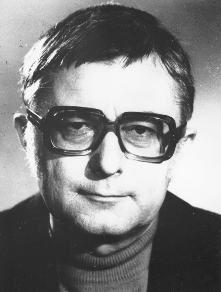Christian Stalling
Christian Stalling was born on 12 December 1926 in Karlsruhe (Germany). He was born into a musicians' family, his father was the Kammermusiker Hans Stalling.
Christian Stalling began to play the piano at the age of 6, but his education was disrupted by the World War II. He finished school in 1944 and was drafted into army as a Flak-assistant. At the end of the war he got into US war captivity. Until 1946 he was arrested at a prisoner-of-war camp where he founded a music band.
After his release in 1947 Christian Stalling worked as a repetiteur at the Badisches Staatstheater and studied music at the Badische Musikhochschule in Karlsruhe. In 1951 he became assistant Kapellmeister at the Badisches Staatstheater, and later the main Kapellmeister of the Stadttheater Hagen from 1957 to 1961. In December 1961 Christian Stalling moved to Frankfurt am Main to work at the Hessischer Rundfunk (HR) as a music editor, a position he fulfilled until his retirement in 1989. Beside his work as an editor he was the principal conductor of the Rundfunkorchester of the HR since 1972 and the leader of the ensemble „Hessenmusikanten“. In 1977 his performance of Kurt Weill's „Aufstieg und Fall der Stadt Mahagony“ was produced for German television. Christian Stalling also hosted a regular broadcast concert series called „Matinée Musicale“. In his last years he gave lectures at the Musikhochschule Frankfurt. Christian Stalling died on 1 July 2000 in Friedrichsdorf-Burgholzhausen.
Christian Stalling composed music his whole life and was a distinguished arranger. In 1955 he was awarded the cultural prize for composition of the city Karlsruhe. His Violin concerto op.7 dates from 1951 and was premiered a year later by Alfred Breith (violin), the orchestra of the Badisches Staatstheater under Otto Matzerath (conductor). A review about the concert by Prof. Dr. Emil Kast was published in the „Neue Zeitschrift für Musik“ (1952, volume 113, issue 3, page 177):
„In the second symphony concert Generalmusikdirektor Otto Matzerath [..] conducted the premiere of the Violin concerto op.7 (1951) by his young assistant Christian Stalling. The first two movements appeared somewhat prim and tonally dry; the final Rondo fascinated on the other hand with humour and plenty of contrasting rhythms. The work is composed for the sake of the violin, difficult, but not unrewarding, and was faithfully and spiritedly performed by Alfred Breith, the young concertmaster of the Staatskapelle, to a great success.“
